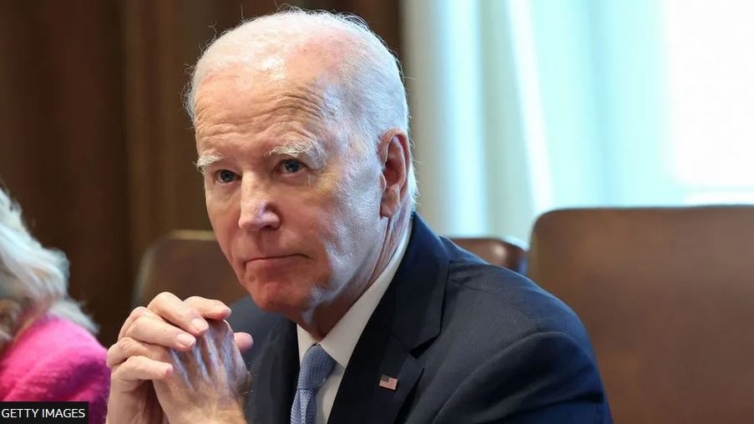The US has announced more than 500 new sanctions against Russia over its invasion of Ukraine and the death of opposition leader Alexei Navalny.
These include measures against Russia's main card payment system, financial and military institutions, and officials involved in Navalny's imprisonment.
The EU has also announced new sanctions on access to military technology.
The measures mark a week since Navalny suddenly died in an Arctic Circle jail.
US President Joe Biden, who met the critic's widow and daughter in San Francisco on Thursday, has said there can be "no doubt" the Russian president was to blame for his death.
But it is unclear what impact the sanctions will have on Russia's economy.
The newly-announced US measures also include nearly 100 firms and individuals which will also face export restrictions.
Others target the state-owned operator of Mir, Russia's main payment system, which has become more prominent since Visa and Mastercard suspended their services there.
Companies involved in powering Russia's war effort, developing the country's future energy production and its co-operation with Iran over drones will also be hit.
More than two dozen entities outside of Russia - including people in China, the UAE, Vietnam and Lichtenstein - have also been sanctioned, accused of being connected to businesses that send materials to Russia's military.
In a statement, President Biden said they would "ensure" Russian President Vladimir Putin "pays an even steeper price for his aggression abroad and repression at home".
This latest package brings the number of entities sanctioned to over 4,000, and comes on the eve of the second anniversary of Russia's full-scale invasion of Ukraine.
"Two years ago, he tried to wipe Ukraine off the map. If Putin does not pay the price for his death and destruction, he will keep going," Mr Biden said in the statement.
On Friday, the EU also announced its 13th raft of sanctions - targeting nearly 200 companies and people accused of helping Russia procure weapons, or of involvement in kidnapping Ukrainian children - something Moscow denies.
They included 10 Russian companies and individuals involved in the shipping of North Korean armaments to Russia, including North Korea's defence minister.
"We remain united in our determination to dent Russia's war machine and help Ukraine win its legitimate fight for self-defence," said EU Foreign Policy Chief Josep Borrell.
The EU has now listed more than 2,000 individuals since the war started.
In response, Russia's foreign ministry said it had significantly expanded a list of EU officials and politicians banned from entering Russia.
"The European Union is continuing its fruitless attempts to put pressure on Russia through unilateral restrictive measures," it said in a statement.
Latest Stories
-
Mothers celebrate arrival of Christmas Day babies at Ridge Hospital
24 minutes -
Alleged National Security operative remanded over GH₵1m recruitment scam
52 minutes -
Sametro Group of Companies donates to widows in Tarkwa Nsuaem Municipality to mark Christmas
1 hour -
Morocco’s Family Code revision proposals unveiled in Rabat
3 hours -
Saglemi fire: No documents lost, redevelopment project unaffected – Oppong Nkrumah
3 hours -
WAEC uncertain about meeting Dec. 29 deadline for WASSCE results
3 hours -
‘She Leads Project’ calls for more female representation in politics to address women’s issues
3 hours -
DJ Promise crowned Best Radio DJ at Dangme Music Awards 2024
3 hours -
Re-collation: Court sets Dec. 27 to hear NDC’s suit against EC
4 hours -
Let’s remain positive, optimistic, and with calmness, rebrand our party – Afenyo-Markin
4 hours -
L’aîné HR celebrates 30 years of excellence in HR management in Ghana
5 hours -
Corporate Wellness: Elegant Homes emphasizes impact of Annual Health and Family Fun Day
5 hours -
BoG issues bancassurance directives to stakeholders in financial sector; warns of sanctions
5 hours -
African Paralympic Committee President sends festive greetings to fraternity
6 hours -
Ghana-Russia Centre holds its first corporate social responsibility event in Ghana
6 hours

